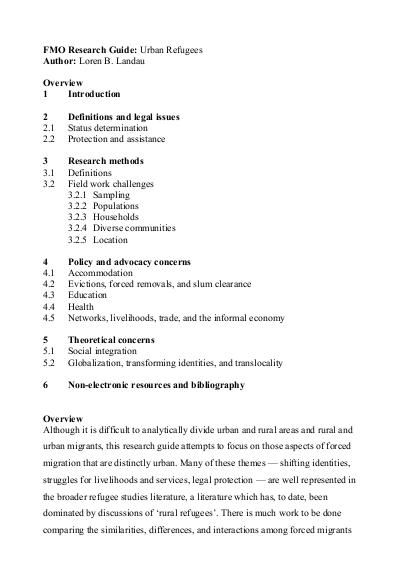
Although it is difficult to analytically divide urban and rural areas and rural and urban migrants, this research guide attempts to focus on those aspects of forced migration that are distinctly urban. Many of these themes — shifting identities, struggles for livelihoods and services, legal protection — are well represented in the broader refugee studies literature, a literature which has, to date, been dominated by discussions of ‘rural refugees’. There is much work to be done comparing the similarities, differences, and interactions among forced migrants living in camps, rural settings, and urban environments. This research guide, however, is premised on the belief that the greatest analytical purchase comes from integrating the study of urban forced migrants with more general discussions of urbanization and urban phenomena. Such inquiries, especially when used in conjunction with general refugee studies literature, can provide conceptual and methodological guidance, hypotheses, and comparative reference. Drawing attention to the under-explored dimensions of urban life has the added benefit of helping refine existing causal and empirical assumptions and conceptual categories. Geographically, this research guide has a particular focus on sub-Saharan Africa, due to the author’s experience in conducting research in that region.
Resource collections
- UN Habitat - Urban Response Collection
- Urban Response - Urban Crisis Preparedness and Risk Reduction
- Urban Response Collection - Community Engagement and Social Cohesion
- Urban Response Collection - Economic Recovery
- Urban Response Collection - Environment and Climate Change
- Urban Response Collection - Housing, Land and Property
- Urban Response Collection - Urban Crisis Response, Recovery and Reconstruction
- Urban Response Collection - Urban Resilience